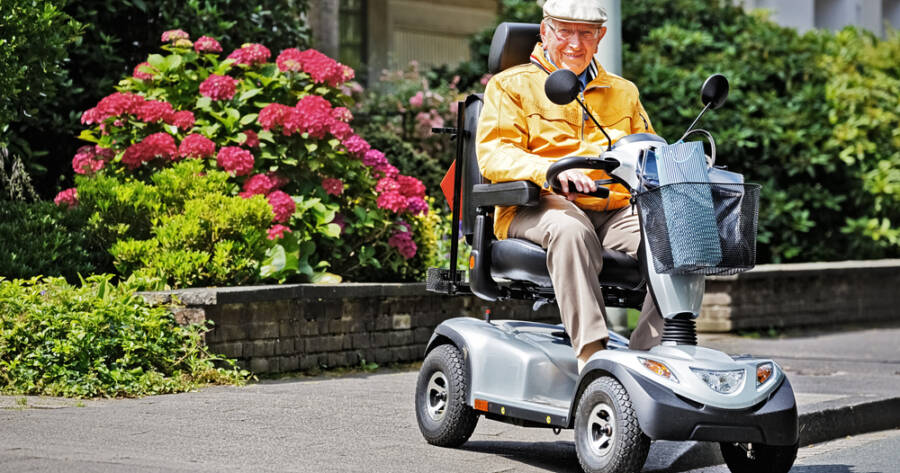Mobility scooters are a vital resource for individuals with limited mobility, providing the freedom and independence to navigate daily activities. However, understanding how to secure a mobility scooter through Medicare involves navigating specific eligibility criteria and coverage rules. Learn everything you need to know about Medicare’s role in covering mobility scooters, including the factors affecting eligibility and the steps needed to acquire one through this vital program.
Understanding Medicare Coverage for Mobility Scooters
Medicare is a federal health insurance program primarily for individuals aged 65 or older, with certain younger individuals qualifying due to disability or specific conditions. Under Medicare Part B, known for covering outpatient care and medical equipment, mobility scooters can be considered durable medical equipment (DME). For a mobility scooter to qualify for coverage, it generally needs to meet specific eligibility criteria, and the beneficiary must demonstrate medical necessity.
This coverage is designed to assist individuals whose mobility limitations curtail their ability to perform daily activities independently within their home. Having a clear understanding of the coverage process ensures that eligible beneficiaries can access the mobility aids they need to maintain quality of life.
Eligibility Requirements for Coverage
To access a mobility scooter under Medicare, several eligibility requirements typically must be met:
- Medical necessity: A primary stipulation for coverage is that the mobility scooter is medically necessary. This often means that the scooter is essential for conducting daily activities at home, such as moving between rooms or accessing essential living areas. The individual’s physician must provide documentation supporting this need.
- Doctor’s assessment and prescription: Medicare requires a face-to-face examination with a healthcare provider, who assesses the individual’s mobility limitations. If the healthcare provider determines that a mobility scooter is medically necessary, they can provide a written prescription indicating that need.
- Home suitability: The individual’s home must be suitable for a mobility scooter, free from barriers that may inhibit operation. Medicare considers whether the scooter can be effectively used within the home environment.
- Medicare-enrolled supplier: The mobility scooter must be acquired through a supplier enrolled with Medicare. This ensures compliance with coverage criteria and mitigates the risk of denial for non-compliance.
Meeting these criteria lays the groundwork for successfully acquiring a mobility scooter through Medicare, enabling individuals to enhance their independence.
Steps to Obtain a Mobility Scooter Through Medicare
The process of securing a mobility scooter through Medicare typically involves several steps that streamline acquisition while ensuring coverage compliance:
- Consultation with healthcare provider: The first step involves consulting with your physician who will evaluate your mobility needs and determine if a scooter is necessary. They will assess whether your condition meets Medicare’s criteria for coverage.
- Face-to-face examination: A face-to-face examination with your healthcare provider is mandatory. They will document why a scooter is necessary for daily activities and provide the necessary paperwork for Medicare.
- Collecting documents: Gather essential documents, including the prescription for the scooter, medical records, and any other required paperwork. Accurate documentation ensures a smoother approval process.
- Contacting a supplier: Locate a supplier enrolled with Medicare, confirming that they can furnish a compliant mobility scooter. This step is crucial to prevent coverage denial due to use of non-enrolled providers.
- Submitting a claim: Medicare claims typically require submitting all documentation through the supplier. Ensure that all paperwork reflects Medicare’s submission guidelines to avoid delays.
Following these steps systematically can increase the likelihood of approval and expedite the path to regaining mobility independence through a covered scooter.
Understanding Costs and Potential Financial Assistance
While Medicare offers coverage for mobility scooters, out-of-pocket expenses may still exist. Under Medicare Part B, individuals usually pay 20% of the Medicare-approved amount, after meeting their annual deductible.
For those requiring financial assistance, additional options like Medicaid or Medicare Advantage Plans may offer supplementary support. Medicaid provides aid based on income eligibility, and some Advantage Plans may include broader DME coverage. Exploring these options can help offset personal costs.
It is vital to stay informed about potential programs, payment plans, or community resources, which could bridge any financial gaps, ensuring individuals receive the mobility support they need without undue financial strain.
Appeals Process and Overcoming Denials
If coverage for a mobility scooter is denied, options exist to challenge Medicare’s decision through an appeals process. This process involves several levels, beginning with a redetermination request from the Medicare contractor and advancing to more formal appeals if necessary.
To initiate an appeal, compile all relevant documentation, including the initial denial notice, medical records, and a statement by your healthcare provider supporting the need. Presenting a comprehensive case increases the chances of a successful appeal, potentially reversing a denial.
The appeals process underscores the importance of thorough documentation, clear communication with providers, and persistence in advocating for necessary mobility aids.
Navigating Medicare for Mobility Scooters
Acquiring a mobility scooter through Medicare requires understanding key eligibility criteria and diligently following prescribed steps for coverage. By ensuring medical necessity, proper documentation, and compliance with supplier requirements, individuals can enhance their daily independence and quality of life.
Navigating Medicare’s complex landscape can be challenging, but with thorough preparation and awareness of potential financial aids or appeals processes, obtaining needed mobility support becomes more attainable. Empowered by mobility scooters and Medicare’s provisions, individuals can look forward to increased freedom and improved participation in daily activities. As healthcare systems continue evolving, staying informed and proactive will be essential in securing vital supportive technologies.
